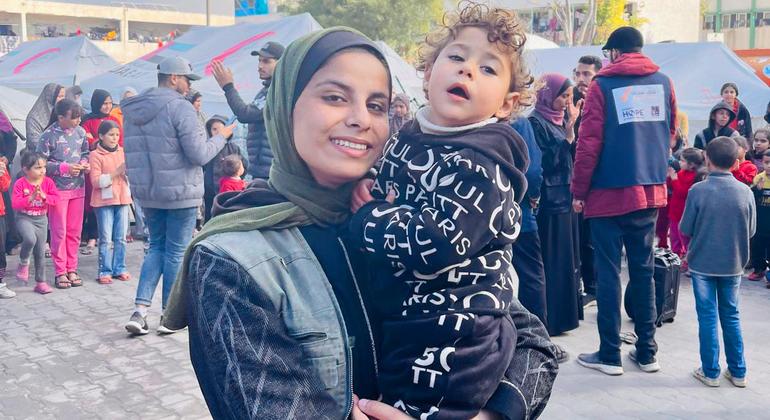Nurturing Hope and Leadership for Young People in Gaza

A volunteer with the Sharek Youth Forum, a local non-governmental organization (NGO) in war-torn Gaza, Al Shamali is now displaced for the ninth time and living in a crowded refugee camp as the conflict with Israel enters its 10th month.
Before the latest violence, she ran her own communications and graphic design company, where she honed the leadership skills she now imparts to hundreds of Gazans.
“I was motivated to alleviate the suffering of the people of Gaza,” she said.

Amid continued displacement and destruction in Gaza, children are being provided with vital psychosocial support.
‘Young people embody the soul and energy of our country’
“I want to show the world that no circumstance can extinguish the hope of our young people,” she explained.
Ms. Al Shamali and her colleagues are providing practical support, from education programs to distributing clean water in refugee camps and cultivating solidarity among Gaza’s youth.
She described her volunteering experience as “transformative”, explaining that it helped her get through the crisis, strengthened her resilience and affirmed her belief in the potential of future generations “because young people embody the soul and energy of our country”.

Children in Gaza hold lanterns to celebrate the holy month of Ramadan in March. (file)
Catalyst for change
Some 1.9 million people are currently displaced in Gaza, many of them multiple times. Most live in makeshift shelters that are unsafe and unsanitary, greatly increasing their risk of disease and gender-based violence, while also making it difficult to access even the most basic health care.
A youth programme is being launched in December 2023 with the support of the UN sexual and reproductive health agency, United Nations Population Fundhas so far attracted nearly 1,000 volunteers to support more than 90,000 young people across Gaza.
One million children in Gaza now need psychological support.
Funded by Education Above All, the initiative provides psychological counselling, stress reduction activities, support for survivors of gender-based violence and essential supplies and advice in public health campaigns.
Such efforts are needed not only to meet the urgent psychosocial needs of young people, but also to equip young people affected by conflict and trauma with the skills to rebuild a more peaceful future. Research from conflict and post-conflict contexts shows that peer- and survivor-led support programmes can significantly improve the health and well-being of women and young people exposed to violence.
“The most valuable investment lies in empowering them as owners of their ideas, initiatives and projects,” said Ms. Al Shamali. “They can find solutions to society’s challenges as leaders, innovators and our future.”
Volunteers also distributed Menstrual hygiene essentials and sanitary supplies for women and girls, rebuilding classrooms, installing bathrooms and solar panels in displacement camps.

Ahmed Halabi was born and raised in Gaza City and currently volunteers for local NGO and UNFPA partner Save Youth Future Society.
The resilience of youth in the war in Gaza
“Children are going through what I went through as a young man: pain, siege and war,” said Ahmed Halabi. “No child should have to suffer like this.”
Halabi, 26, was born and raised in Gaza City and currently volunteers for local NGO and UNFPA partner Save Youth Future Society. He channels his childhood experiences living under Israeli occupation into designing youth-led initiatives that provide psychological support primarily to children, adolescents and women.
Psychological services are vital in Gaza, where one million children are currently in need of such support. Reports of gender-based violence are on the rise in Gaza City and the north as services close and staff are forced to flee the ongoing attacks and unrest.
An initiative encourages young men and boys to adopt positive gender roles in the family and to relieve stress and anger by playing sports such as football. Doctors also dress up as clowns to visit children and provide first aid, while local NGOs such as Charity Fund and Eid Lantern distribute gifts and lanterns for Eid, a commitment to restoring a sense of normalcy amid the chaos of war.
“We saw happiness in the children, laughter as if hope had returned to their eyes,” he said. “Parents also looked at their children with smiles and joy.”
Starting with 10 volunteers supporting 50 children, it has now grown to 40 volunteers and supports over 300 children.

Ahmed Halabi uses his childhood experiences living under Israeli occupation to design youth-led initiatives to provide psychological support to children, adolescents and women.
A safe space for the future
There are still huge challenges, namely fuel shortages, high rental and operating costs and severe supply shortages.
To help fill these gaps, UNFPA is supporting six safe spaces in displacement camps in Gaza City and northern Gaza, which provide psychosocial support, sexual and reproductive health care, referrals to legal services and essential hygiene kits. Youth volunteers at these spaces engage other young people in arts and crafts, sports, singing, theatre and games.
Although they themselves are traumatized by the pain of their families, friends and fellow Gazans, those working in these roles continue to give their unwavering dedication.
“If you ask me about the biggest benefits I get from this volunteering, I would say it is everything I can provide for displaced children in my city,” said Mr. Halabi.


